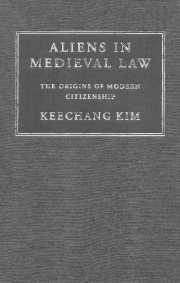4 - Foreign religious houses
Published online by Cambridge University Press: 08 July 2009
Summary
The one and a half centuries that followed the Norman Conquest were marked by ‘a stupendous resurgence of monasticism’ in England. The number of monasteries increased from 61 to about 700 between 1066 and 1215. Countless manors and estates were transferred to newly created or existing religious houses on both sides of the Channel for the spiritual well-being of the donor or the transferor. In this chapter, we examine the foreign control of English lands resulting from these monastic endowments. It may be a delicate issue to determine the degree of ‘foreignness’ of the English daughter-houses of various foreign religious orders. We know that an alien prior could bring an action and the defendant's plea that the prior was an ‘alien born’ was not allowed. The reason was that the prior was bringing the action in right of the religious house, not in his own right (car il port l'action come prior in iure domus et non in iure proprio). Whether cases like this can be interpreted as showing the existence of a theory of ‘corporation’ in medieval English law is not an easy question. But at least the case clearly shows that priors and abbots were regarded as holding the land not in the same manner as a lay landholder.
- Type
- Chapter
- Information
- Aliens in Medieval LawThe Origins of Modern Citizenship, pp. 89 - 102Publisher: Cambridge University PressPrint publication year: 2000



